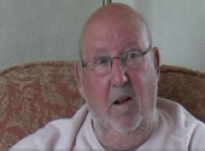Derek - Interview 16

More about me...
Derek’s wife had first noticed a change to his nipple and they asked a doctor at the hospital about it when they were there for an unrelated issue. He advised him to see his GP. However his own GP dismissed his concerns and he had to persist to get a referral to see a specialist. When he received his diagnosis he felt totally unprepared and shocked at the news.
When Derek told his GP something 'wasn't right' with his right breast, the GP dismissed it. Derek's wife went back to the GP with him to insist that he needed to have a mammogram.
When Derek told his GP something 'wasn't right' with his right breast, the GP dismissed it. Derek's wife went back to the GP with him to insist that he needed to have a mammogram.
Say it was about 2001 approximately, about eight years ago I was… first diagnosed. I didn’t personally notice. I had sort of a… something I felt wasn’t right on me right bust and me wife then says, you know, I should go to see somebody. Before that I had, I was on warfarin then, a blood clot, and I think that’s where it really came from. When I was discharged the doctor there says, yeah, cos he had it in me notes that I’ve got an irritation on me bust and he had a look at it and he suggested that I should go to seek, seek medication, you know, which I did do, and I went with me wife to see about this. The doctor says it was nothing to be concerned about. They wouldn’t believe me at all. This was going on for quite some time. In the end me wife did come with me and she really had it out with him and it basically boiled down to, “What if it had been me as a woman coming to see you, what would you had have sent me for?” What do you call it, the word, I can’t remember the word…
Derek still experiences some stiffness under his arm, even some years after his surgery.
Derek still experiences some stiffness under his arm, even some years after his surgery.
And how was your wound?
It was fine, yeah. I just didn’t realise how big or large it were or… were quite long. I didn’t realise that. I’ve not much recollection of that, of the operation or anything. I’ve not much… can’t really remember much about it. Obviously stiffness, I still get stiffness now after all this time because apparently when I go to the doctor’s to ask her about this, it was, it says it’s because of the depth of how far they’ve gone down through and my lymph glands here, I was very fortunate as well I didn’t get any bloating or nothing like that.
Derek had taken tamoxifen for five years and had no side effects. then took another drug for a while.
Derek had taken tamoxifen for five years and had no side effects. then took another drug for a while.
Even after many years, Derek was still asked what his tamoxifen tablets were for at the chemist. It was just one example of people's disbelief or surprise that he had breast cancer.
Even after many years, Derek was still asked what his tamoxifen tablets were for at the chemist. It was just one example of people's disbelief or surprise that he had breast cancer.
Can I take you back to the, your diagnosis? What sort of information were you given at the time?
Derek's manager and workmates were very supportive when he went back to work. His colleagues offered to help with any heavy lifting when he first returned.
Derek's manager and workmates were very supportive when he went back to work. His colleagues offered to help with any heavy lifting when he first returned.
You were obviously working at the time you had your diagnosis.
Derek goes every month to his group which is mainly geared towards fundraising, although they did have chance to express ‘what’s happened’.
Derek goes every month to his group which is mainly geared towards fundraising, although they did have chance to express ‘what’s happened’.

